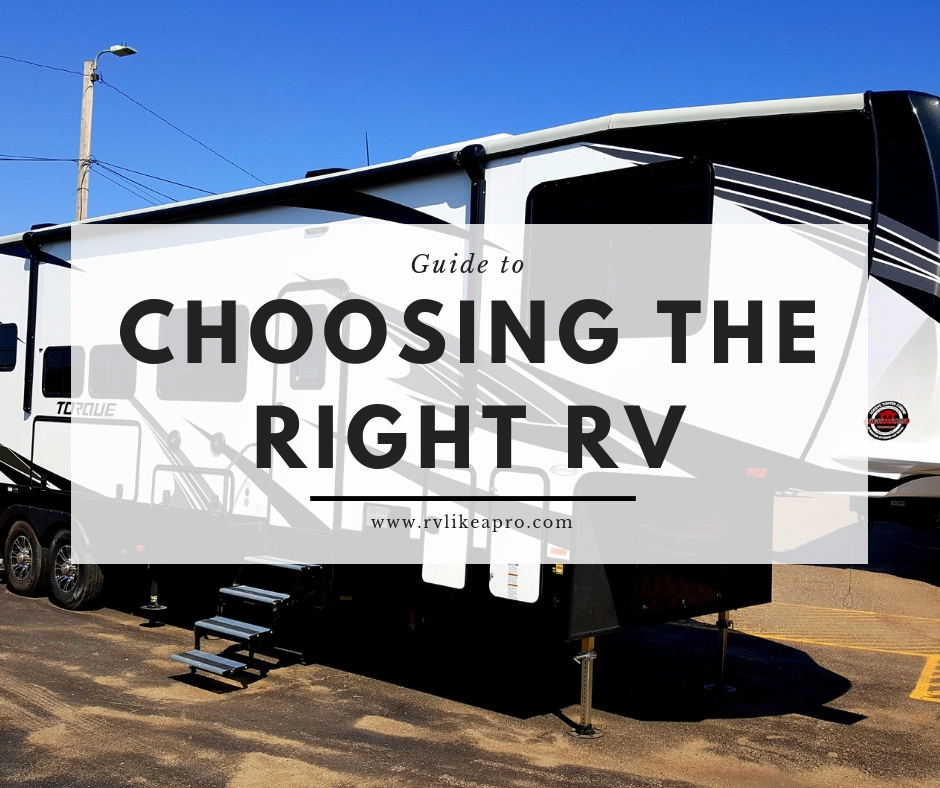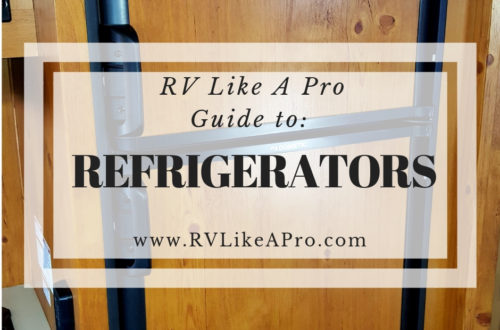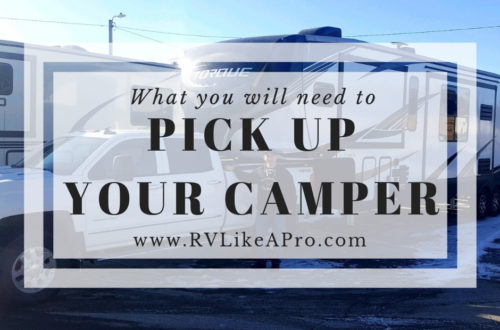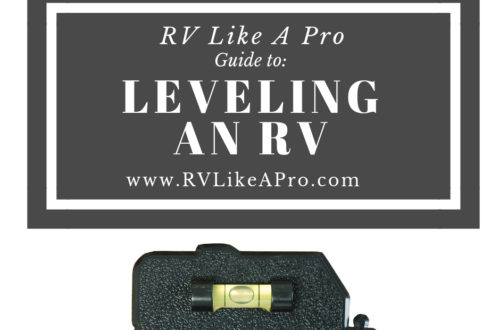
What to Consider When Buying a Camper
So you have decided you want to start enjoying the RV lifestyle! Good for you! There are many different makes and models of RVs. The first decision will be: what kind of RV do you want? The next decisions is: do you want to buy new or used? Here are some things to consider:
Types of RVs
The 5 main types of RVs are: motorhomes, travel trailers, 5th wheel, pop-ups, and pickup campers. Typically people already have a pretty good idea of what category of RV they are looking to purchase so we are only going to touch on each type of RV in this article.
Motorhomes
Motorhomes are the RVs that move on their own power. They drive.
Class A: These are the largest and most expensive motorhomes. Think busses. They do not however require a special drivers license.
Class B: This may seem a little out of order but these are actually the smaller motorhomes. Think large vans.
Class C: These are the medium motorhomes. These are the ones with storage or sleeping quarters above the driver. These are also usually the cheapest option in motorhomes.
Tow behind RVs: Travel Trailer vs. 5th Wheel
Expense: Travel trailers are often less expensive than a 5th wheel.
Weight: Travel trailers are usually lighter than a 5th wheel. This gives you the advantage of being able to pull it with a lighter tow vehicle.
Traveling down the road: Fifth wheel trailers travel down the road much better. Especially if you are traveling around the country or going across the plains.
Towing Vehicle: You should have at least a three-quarter ton pickup if you’re going to haul a 5th wheel. It is possible to pull a few of the small 5th wheel trailers with a 1/2 ton vehicle but I wouldn’t recommend it. Many travel trailers can be towed with a 1/2 ton pickup or larger SUV.
Pop-Ups
Pop-Ups or tent trailers are the least expensive RV. The are generally lightweight and offer room for many to sleep. Most have a refrigerator and stove but no bathroom.
Pickup Campers
Pickup campers are mounted in the back of a pickup truck bed and often hang over the front of the cab. These are very small but allow you tow something else behind your vehicle like a boat or trailer. These are often surprisingly expensive.
Other things to consider
How long of a trailer would you like?
When it comes to how long a trailer is, a lot of people are worried about a long trailer. As long as your truck is equipped to pull the weight and you have an equalizer hitch, length really isn’t that big of a deal. Actually, a longer trailer is easier to back up and typically goes down the road smoother as well. In my opinion length of the trailer really only becomes a major consideration when you are considering where you are to store the RV and how long your driveway is. Though some campgrounds (mostly State Campgrounds) do have limited spaces for long RVs. If these are the places you usually like to camp, I recommend researching their length limitations.
What floor plan would you like?
This is probably the most fun part of buying a camper. Most of our trade-ins that we get our because people bought a camper and didn’t realize the floor plan wasn’t useful for them. Some things to consider:
- How many people will be sleeping in the RV? If you’re a parent or grandparent you may want bunks or bunk room. Having a daughter I know she likes to have her own spot. A lot of the bunk rooms also have the outside kitchen there’s a little bit of room underneath that bunk, The manufacturer’s often utilize it.
- If it’s just a couple would you like a rear kitchen or a mid kitchen?
- How big of bed would you like?
- Do you need to have a bathtub or can you get by with just a shower?
- Would you like a couch, rocker, swivel chairs or a dinette?
All of these considerations will help determine how long your camper is going to be. I have learned that it is always nice to have seating options. After sitting in one spot for a week, even the best chair becomes uncomfortable.
Should you buy a new or used RV?
New RVs
Of course the biggest bonus to buying a new RV is that it’s new. You know that nobody did anything weird in it. It wasn’t neglected. And of course, the biggest bonus, it comes with at least a one-year warranty on everything bumper to bumper. Remember, RVs move, they bounce down the road at 60mph. Things wiggle, and vibrate and shift. A warranty is a really nice thing to have.
Warranty’s cover big issues like your furnace or water heater doesn’t work. It will also cover smaller issues like a piece of trim being loose or a cupboard door keeps opening up while you traveling. Keep a list of these nuisances and bring your camper back to your dealer while its under warranty. Your dealer will make the needed adjustments or repairs. It won’t cost you anything as long as you didn’t cause whatever the issue is to happen.
Note: Your dealer does not have every component of every camper in stock. Some parts may need to be ordered from the manufacturer. Sometimes it takes a LONG time to get certain parts and components from the manufacturer. Your dealer is just as frustrated by this as you are. Don’t take it out on them.
Used RVs
RVs are like any other vehicle. They loose value as soon as you drive them off the lot. For this reason, a used camper is a good option. There are of course two man options for purchasing a used RV.
Private Party vs Dealership
Often and advantage to buying from a private party is that the price is less expensive, but not always. You also get the privilege of meeting the previous owner to try to decide if you think they took care of the camper and maintained everything properly. You should note though that it’s always easier to trade your camper in on a new one then sell it outright. If the the seller is buying a new camper and didn’t trade it in, this may be because they didn’t get the price they wanted for the RV on trade in. Or it may be that there is a problem with the camper that the dealer found during their inspection and the dealer didn’t want it. It will be your job to figure out which.
Buying a used camper from a dealership will give you a lot more choices. Typically a dealer will have multiple used RVs for you to walk around and look at. You will also have a sales person there to answer any questions. Dealers will typically also do a “pre-delivery inspection”. This inspection looks at the structure as well as every component of the RV.
For more information on what to look for when buying a used RV, please see here.
Keep in mind you almost never see any of the issues that camper might have in the pictures that you’ll see online. Every camper can look nice in a picture.
A great place to see every kind of RV and camper you can think of is a “camper show”. In our area, these are typically held in January – March of every year. These shows will give you a great head start on knowing what you like best in an RV.
Happy camping!





5 Comments
Becky Russell
Thanks for sharing! I wish I had read this years ago when we bought our RVs. We first bought a bumper pull then a Class A motorhome. It is very informative and helpful!
Desiree
Thank you so much for the post. It was well organized and helpful with thinking through the concepts needed to consider before making such a large/significant purchase.
Heather
Good advice throughout. There are a lot of considerations on RVs. Sometimes you have to drive one for awhile before you really know what you want, so maybe try a rental on a few short trips to see what works best for you. At this point, I am thinking smaller is better! I would rather stay at an AirBnB than a RV Park, and I don’t enjoy driving a vehicle that is the size of a semi truck! 🙂
Lisa Rockenbach
We bought our 37ft 1986 KOMFORT RV from an OLDER couple we were informed EVERYTHING worked but we had to FIX & REPLACE the TOILET & some waterlines its overall in good shape we are living in it & HOPEFULLY it will last us a few years so we can save & get a 5th wheel or something larger
Michael
House goes on the market this week, buying a 16 ft. Bambi Airstream, retiring and hitting the road, adventiues to come!